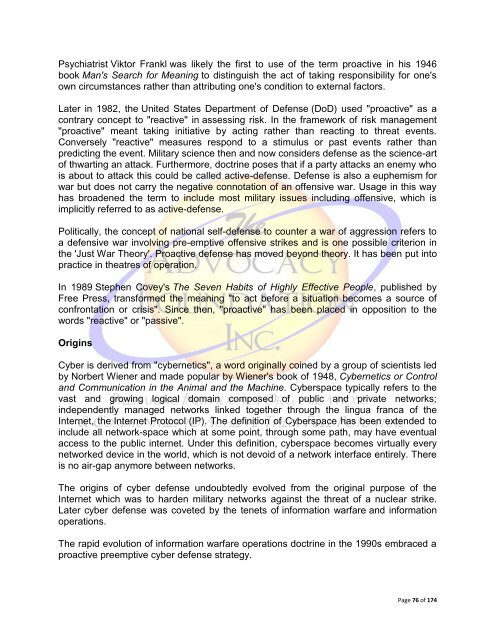International Cyber Terrorism
International Cyber Terrorism
International Cyber Terrorism
- No tags were found...
Create successful ePaper yourself
Turn your PDF publications into a flip-book with our unique Google optimized e-Paper software.
Psychiatrist Viktor Frankl was likely the first to use of the term proactive in his 1946<br />
book Man's Search for Meaning to distinguish the act of taking responsibility for one's<br />
own circumstances rather than attributing one's condition to external factors.<br />
Later in 1982, the United States Department of Defense (DoD) used "proactive" as a<br />
contrary concept to "reactive" in assessing risk. In the framework of risk management<br />
"proactive" meant taking initiative by acting rather than reacting to threat events.<br />
Conversely "reactive" measures respond to a stimulus or past events rather than<br />
predicting the event. Military science then and now considers defense as the science-art<br />
of thwarting an attack. Furthermore, doctrine poses that if a party attacks an enemy who<br />
is about to attack this could be called active-defense. Defense is also a euphemism for<br />
war but does not carry the negative connotation of an offensive war. Usage in this way<br />
has broadened the term to include most military issues including offensive, which is<br />
implicitly referred to as active-defense.<br />
Politically, the concept of national self-defense to counter a war of aggression refers to<br />
a defensive war involving pre-emptive offensive strikes and is one possible criterion in<br />
the 'Just War Theory'. Proactive defense has moved beyond theory. It has been put into<br />
practice in theatres of operation.<br />
In 1989 Stephen Covey's The Seven Habits of Highly Effective People, published by<br />
Free Press, transformed the meaning "to act before a situation becomes a source of<br />
confrontation or crisis". Since then, "proactive" has been placed in opposition to the<br />
words "reactive" or "passive".<br />
Origins<br />
<strong>Cyber</strong> is derived from "cybernetics", a word originally coined by a group of scientists led<br />
by Norbert Wiener and made popular by Wiener's book of 1948, <strong>Cyber</strong>netics or Control<br />
and Communication in the Animal and the Machine. <strong>Cyber</strong>space typically refers to the<br />
vast and growing logical domain composed of public and private networks;<br />
independently managed networks linked together through the lingua franca of the<br />
Internet, the Internet Protocol (IP). The definition of <strong>Cyber</strong>space has been extended to<br />
include all network-space which at some point, through some path, may have eventual<br />
access to the public internet. Under this definition, cyberspace becomes virtually every<br />
networked device in the world, which is not devoid of a network interface entirely. There<br />
is no air-gap anymore between networks.<br />
The origins of cyber defense undoubtedly evolved from the original purpose of the<br />
Internet which was to harden military networks against the threat of a nuclear strike.<br />
Later cyber defense was coveted by the tenets of information warfare and information<br />
operations.<br />
The rapid evolution of information warfare operations doctrine in the 1990s embraced a<br />
proactive preemptive cyber defense strategy.<br />
Page 76 of 174
















